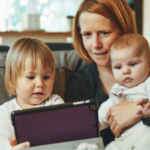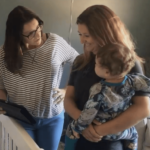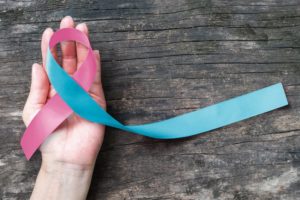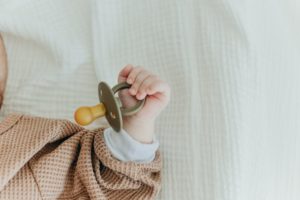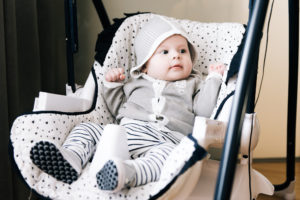When you buy through our links, we may earn a commission. Products or services may be offered by an affiliated entity. Learn more.
Newborn Sleep Schedule
From birth to 3 months old, sleep needs can vary widely and range from as few as 11 hours to as many as 19 hours of sleep every day. But because infants take a while to fully develop their sense of day and night, they tend to sleep during long naps and cannot sleep through the night until they are a little older.
Newborn sleep schedules can feel confusing for adults, and new parents or caregivers may worry when their child is awake for much of the night and spends much of the day asleep. We discuss what to expect from a newborn sleep schedule, how your baby’s sleep patterns evolve over the first year of life, and strategies to help pave the way for better sleep in later childhood.
What Is a Newborn Sleep Schedule?
For around the first 2 months of life, infants do not follow a sleep schedule linked to the time of day . Instead, newborns take naps spaced throughout a 24-hour period, with each nap lasting between one and four hours. Between naps, infants wake up to feed. How often they wake up to feed is affected by whether they are breastfed or formula-fed . Breastfed babies may need to feed around every two hours, while formula-fed babies may go closer to three hours between feedings.
Experts do not give strict recommendations for sleep schedules in newborns between 0 and 4 months old , because baby sleep habits vary widely at this age.
Developing the Sleep-Wake Cycle
Wake and sleep times in humans generally follow a circadian rhythm, which are natural patterns that occur nearly every 24 hours . Circadian rhythms are controlled by a biological clock in the brain that syncs these daily cycles to a person’s external environment.
Babies are born without a strong circadian rhythm. Daily cycles develop over time, as exposure to light and dark in their environment helps newborns develop a sleep-wake cycle that coordinates with periods of day and night.
Two hormones that affect when newborns sleep and when they wake up are melatonin and cortisol. As infants reach 8 to 9 weeks old, the release of these hormones begins to follow a circadian rhythm. This is the period when an infant’s sleep may start to become more predictable.
Help Your Baby Sleep Better With Pediatric Sleep Coaching
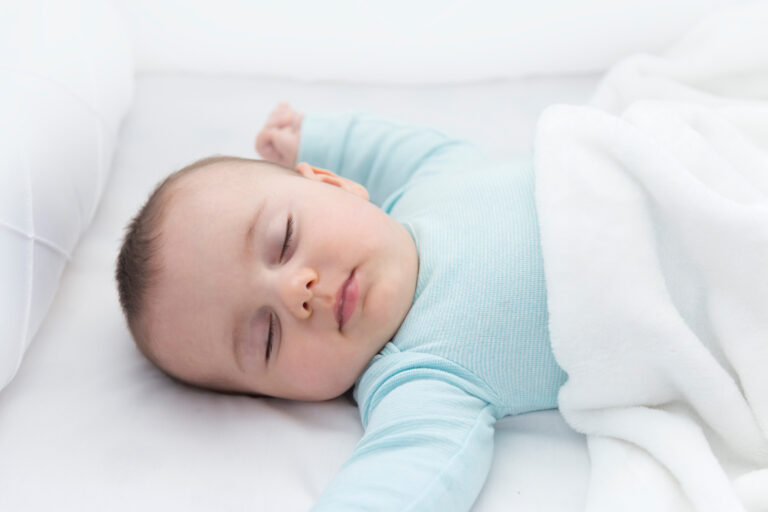
our partner at sleepdoctor.com
Learn More“Life-changing! My anxiety about my son’s sleeping habits were immediately reduced after talking to Sara. She went above and beyond to tailor a schedule to our goals, answer our questions, keep us on track, and check in to encourage us when we just thought we couldn’t do it anymore.”
Rachael B. – Verified Customer
When Should You Get Your Baby on a Sleep Schedule?
Once a baby’s sleep starts to fall into a somewhat predictable pattern, caregivers may try to consolidate that sleep into larger chunks. Realistically, most babies still need to take several daily naps until their first birthday . However, by gently nudging the rest of their sleep time to the nighttime hours, the hope is that babies can work toward a more mature sleep schedule and adults can get some much-needed rest.
A newborn’s sleep starts to consolidate around 2 months old, and many babies start sleeping through the night between the ages of 4 and 6 months . Experts recommend waiting until a baby is at least 4 to 6 months old before attempting sleep training to further encourage a consolidated nighttime sleep schedule.
Signs a Newborn Is Ready to Sleep
It is helpful to put newborns to bed when they are tired but have not yet fallen asleep. Learning a newborn’s tiredness cues can help caregivers predict when a nap is needed. A newborn may signal that they are sleepy by:
- Crying
- Fussing
- Rubbing their eyes
- Staring off into space
Helping a Newborn Sleep
Parents and caregivers often want to do everything they can to help their newborn sleep. To help newborns get the rest they need, experts suggest adopting soothing and consistent daily habits.
- Establish a bedtime routine: A relaxing and predictable bedtime routine, including activities like cuddling, rocking, walking, and feeding, helps set the stage for healthy sleep habits later in life.
- Watch for sleepiness cues: When a baby starts showing signs of sleepiness, such as fussing or rubbing their eyes, this is a good moment to lay them in their crib or bassinet. Experts recommend putting infants down before they actually fall asleep, to help them become more comfortable going to sleep on their own .
- Provide a comfortable environment: To help the development of a newborn’s circadian rhythm, make sure they get plenty of light and sound during the day, and keep their bedroom dark and quiet in the evening.
- Practice safe sleep habits: To reduce the risk of sudden infant death syndrome (SIDS), always place a newborn to sleep on their back, and try to have them sleep alone in their crib rather than co-sleeping. Additionally, cribs should be free from blankets, bumpers, toys, or other soft bedding .
- Keep feedings low-key: During nighttime feedings, use dim lighting and keep the interaction short and calm. Avoid letting a child sleep with a bottle or breast in their mouth.
- Incorporate tummy time: Allowing a newborn to spend a few minutes on their stomach while they are awake helps with the development of neck and shoulder muscles as well as motor skills. Research also suggests that regular, supervised tummy time during the day might be linked to longer nighttime sleep as a baby grows.
Caregivers should also keep in mind that erratic sleep schedules are normal in newborns since they do not have an established sleep-wake cycle. At this age, the best way to encourage a healthy newborn sleep schedule is to learn to respond to a baby’s cues and adjust accordingly. Eventually, babies settle into a more defined rhythm, which can be further encouraged by adopting healthy sleep habits in the home.
Parents and caregivers who have questions or concerns about their newborn’s sleep habits should talk to a pediatrician. Pediatricians can provide reassurance, support, and evaluate newborns for any underlying health issues.

Still have questions? Ask our community!
Join our Sleep Care Community — a trusted hub of sleep health professionals, product specialists, and people just like you. Whether you need expert sleep advice for your insomnia or you’re searching for the perfect mattress, we’ve got you covered. Get personalized guidance from the experts who know sleep best.
References
13 Sources
-
Deshpande, P., Salcedo, B., & Haq, C. (2022). Common sleep disorders in children. American Family Physician, 105(2), 168–176.
https://pubmed.ncbi.nlm.nih.gov/35166510/ -
A.D.A.M. Medical Encyclopedia. (2021, February 2). Infant – Newborn development. MedlinePlus., Retrieved January 9, 2023, from
https://medlineplus.gov/ency/article/002004.htm -
Kirsch, D. (2022, September 12). Stages and architecture of normal sleep. In S. M. Harding (Ed.). UpToDate.
https://www.uptodate.com/contents/stages-and-architecture-of-normal-sleep -
Yates J. (2018). Perspective: The long-term effects of light exposure on establishment of newborn circadian rhythm. Journal of Clinical Sleep Medicine, 14(10), 1829–1830.
https://pubmed.ncbi.nlm.nih.gov/30353824/ -
National Heart, Lung, and Blood Institute. (2022, March 24). Your sleep/wake cycle., Retrieved January 11, 2023, from
https://www.nhlbi.nih.gov/health/sleep/sleep-wake-cycle -
A.D.A.M. Medical Encyclopedia. (2020, October 2). Bedtime habits for infants and children. MedlinePlus., Retrieved January 9, 2023, from
https://medlineplus.gov/ency/article/002392.htm -
Consolini, D. M. (2022, September). Approach to the patient with a sleep or wakefulness disorder. Merck Manual Professional Version., Retrieved January 9, 2023, from
https://www.merckmanuals.com/professional/pediatrics/care-of-newborns-and-infants/sleeping-in-infants-and-children -
Nasir, A., & Nasir, L. (2015). Counseling on early childhood concerns: Sleep issues, thumb-sucking, picky eating, school readiness, and oral health. American Family Physician, 92(4), 274–278.
https://pubmed.ncbi.nlm.nih.gov/26280232/ -
What you need to know about sleep for your child. (2022). American Family Physician, 105(2).
https://pubmed.ncbi.nlm.nih.gov/35166516/ -
National Center for Chronic Disease Prevention and Health Promotion. (2018, November 27). Tips for better sleep. Centers for Disease Control and Prevention., Retrieved January 11, 2023, from
https://www.cdc.gov/sudden-infant-death/sleep-safely/index.html -
Eunice Kennedy Shriver National Institute of Child Health and Human Development. (n.d.). Babies need tummy time!, Retrieved January 11, 2023, from
https://safetosleep.nichd.nih.gov/safesleepbasics/tummytime -
Buchanan, L., Xu, H., Hewitt, L., Taki, S., & Wen, L. M. (2021). A longitudinal analysis examining the associations of tummy time with active playtime, screen time, and sleep time. Journal of Physical Activity & Health, 18(10), 1215–1222.
https://pubmed.ncbi.nlm.nih.gov/34380110/ -
Perrella, S. L., Dix-Matthews, A., Williams, J., Rea, A., & Geddes, D. T. (2022). Breastfeeding and maternal perceptions of infant sleep, settle and cry patterns in the first 9 months. International Journal of Environmental Research and Public Health, 19(20), 13098.
https://pubmed.ncbi.nlm.nih.gov/36293676/



